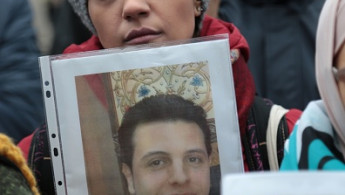Mass grave 'levelled' by Syrian regime to hide evidence: Saydnaya Detainees Association
Satellite imagery has revealed levelling operations at the site of mass graves believed to hold thousands of political detainees killed in Syrian regime detention centres outside of Damascus, a report by the Saydnaya Detainees Association revealed on 30 January.
Satellite analysis of the site shows extensive excavation and levelling of the land, including upturning of the soil, between the summer of 2022 and January 2023.
The association said that the construction activity raises red flags about the Syrian regime "facilitating the destruction and devastation of mass graves" to conceal evidence of mass graves.
"The Syrian regime systematically and deliberately erases and hides its crimes by concealing and destroying evidence that could be used to prove the killings and forced disappearances that occurred after 2011," said Diab Serrih, the CEO of the Saydnaya Detainees Association.
Since the outbreak of the uprising in 2011, the Assad regime detained and tortured Syrian activists on an industrial scale. More than 136,000 Syrians remain in regime detention, according to various estimates.
The fate of most of the detainees and forcibly disappeared remains unknown, with the regime refusing to disclose anything about their whereabouts.
In 2015, the regime started burying detainees who died in the custody of security services in mass graves directly outside the security branch where they died.
According to the Saydnaya Detainees Association, the regime regularly issues false death certificates for detainees citing natural causes.
The families of detainees are generally not notified when the regime issues death certificates but instead find out about the status of their loved ones when visiting civil registries for routine procedures.
In June 2023, the UN General Assembly voted to create an independent body to clarify the fate of the thousands of detainees and disappeared in Syria. The move came after years of lobbying by the families and survivors of detainees to establish such a mechanism.
The Syrian regime objected to the creation of the mechanism, calling it a "flagrant interference in our internal affairs."





 Follow the Middle East's top stories in English at The New Arab on Google News
Follow the Middle East's top stories in English at The New Arab on Google News


